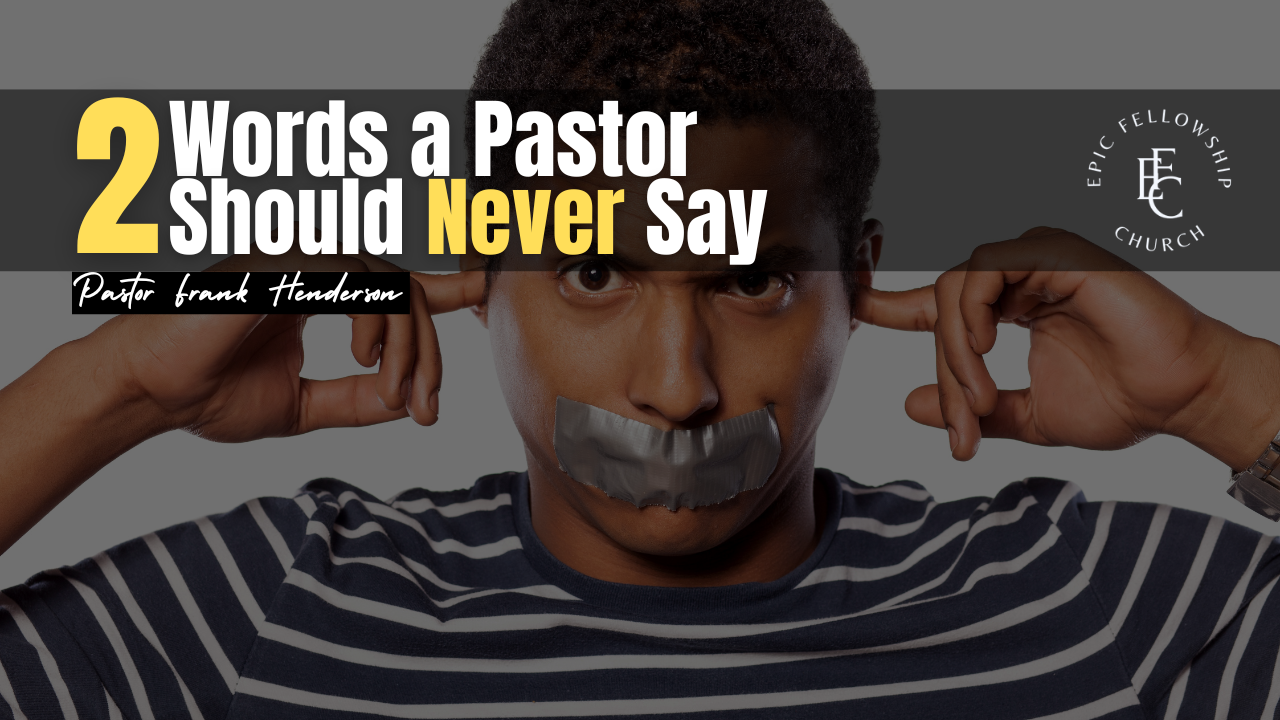Two Words A Pastor Should Never Say
.jpg)

Two Words a Pastor Should Never Say
There are two words that slip out of pastors’ mouths far too easily, and they carry far more weight than we often realize: “my church” and “my people.”
At first glance, they sound innocent, even affectionate. But for anyone entrusted with spiritual leadership, those words are dangerous. Not because of how they sound, but because of what they subtly suggest. When a leader refers to a congregation as “my church” or “my people,” something vital is being misplaced: the Lordship of Jesus Christ over His flock.
This is not nitpicking semantics. It's about spiritual accuracy and theological clarity. These words, if left unchecked, can disorient the congregation and distort the pastor’s role. They blur the line between stewardship and ownership, and when that happens, the Head of the Church is quietly displaced.
The Church Belongs to Christ Alone
Let’s be clear: The church does not belong to the pastor. It never has. It never will.
Jesus said, “I will build My church” (Matthew 16:18). Not Peter’s. Not Paul’s. Not yours. His.
The Apostle Paul drives this point home when he writes, “Christ is the head of the body, the church” (Colossians 1:18), and again in Acts 20:28, when he urges the elders of Ephesus to “Be shepherds of the church of God, which He bought with His own blood.”
That’s the true cost of the church, not years of service, sleepless nights, or faithful preaching (as important as those are), but blood. His blood. Not ours.
So when a pastor says “my church,” it does more than just echo poor wording. It implies misplaced ownership. It risks communicating that the body belongs to the one who leads it rather than the One who died for it.
The People Are His, Not Ours
The same is true for “my people.”
Moses got in trouble for this very attitude. In Numbers 20, frustrated with Israel’s complaints, he lashed out and said, “Must we bring you water out of this rock?” (Numbers 20:10). God’s response was swift and sobering: “Because you did not trust in me enough to honor me as holy in the sight of the Israelites, you will not bring this community into the land I give them” (verse 12).
Why such a severe consequence? Because Moses blurred the line. He positioned himself as the source rather than the servant. The people weren’t his to manage. They were God’s covenant people. And leadership that forgets this inevitably dishonors God.
Pastors and leaders today face the same danger. We are called to shepherd, not to own. The flock is His. “Know that the Lord, He is God. It is He who made us, and we are His; we are His people, and the sheep of His pasture” (Psalm 100:3). Undershepherds must never act like owners.
The Heart of Stewardship
Stewardship means managing something on behalf of someone else. In the case of the church, pastors are appointed as undershepherds, entrusted to care for what Christ purchased.
1 Peter 5:2–4 lays this out plainly:
“Be shepherds of God’s flock that is under your care, watching over them not because you must, but because you are willing, as God wants you to be... not lording it over those entrusted to you, but being examples to the flock. And when the Chief Shepherd appears, you will receive the crown of glory that will never fade away.”
The flock is God’s. It has merely been entrusted to us. Which means, we will give an account. That’s the weight of stewardship: caring for what is not yours while answering to the One who is.
Words Reveal Theology
Why does this matter? Because words shape culture. When a pastor constantly says “my church” or “my people,” the congregation begins to subconsciously affirm it. It creates an atmosphere where the leader becomes the center and Christ is quietly edged out.
Language is never neutral. It reflects belief. When a leader speaks as though they own what only Christ owns, the people are led to believe the same.
We must model what we preach. If we truly believe Christ is the Head of the Church, then our words should align with that truth. Every time we speak of “the Lord’s church,” “God’s people,” or “the body of Christ,” we reinforce right thinking. And right thinking leads to right worship.
A Charge to Pastors and Leaders
Let’s be done with sloppy language that misrepresents spiritual authority. Let’s purge “my church” and “my people” from our vocabulary, not out of legalism but out of reverence.
Call it “the Lord’s church.” Refer to them as “God’s people.” Speak as a steward, not an owner.
Let’s remember who the flock belongs to. Let’s speak and lead in ways that never confuse the matter.
Because it’s not our church. Not our people.
It’s His. Always has been. Always will be.
Now go speak and lead accordingly.
I love you all.
Pastor Frank